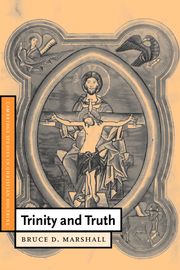Book contents
- Frontmatter
- Contents
- Preface
- A note on translations
- 1 Introduction: theology and truth
- 2 The triune God as the center of Christian belief
- 3 Epistemic justification in modern theology
- 4 Problems about justification
- 5 The epistemic primacy of belief in the Trinity
- 6 Epistemic priorities and alien claims
- 7 The epistemic role of the Spirit
- 8 The concept of truth
- 9 Trinity, truth, and belief
- Index
5 - The epistemic primacy of belief in the Trinity
Published online by Cambridge University Press: 23 December 2009
- Frontmatter
- Contents
- Preface
- A note on translations
- 1 Introduction: theology and truth
- 2 The triune God as the center of Christian belief
- 3 Epistemic justification in modern theology
- 4 Problems about justification
- 5 The epistemic primacy of belief in the Trinity
- 6 Epistemic priorities and alien claims
- 7 The epistemic role of the Spirit
- 8 The concept of truth
- 9 Trinity, truth, and belief
- Index
Summary
An investigation of its practices has suggested that the church can endure as a coherent community only if it continually tests other beliefs for truth or falsity by seeing whether they are consistent with its trinitarian identification of God. Should this distinctive epistemic procedure be incoherent or otherwise unreasonable, then what follows is presumably not the continuing embrace of irrational practices, but their abandonment, and so a basic change in communal identity. We therefore need to determine whether the church has the epistemic right to regard its own most central beliefs as the primary criteria of truth, and if so, what confers this right. This requires a closer look at the contents of the church's trinitarian nexus of belief.
Jesus' universal primacy
Jesus undertakes his journey from Bethlehem to Golgotha, so the church believes, for the life of the world (cf. Jn. 6:51). The gift of life which Jesus undertakes to give the world is not, it seems, an event or state of affairs which comes to pass apart from or in addition to his acceptance and enactment of the mission from the Father which leads to the cross. Rather the world's deliverance from death, its redemption and reconciliation to God, coincide with the particular and unrepeatable sequence of actions and events by which the church identifies Jesus. Jesus' death does not simply symbolize or promise the world's deliverance, but actually puts death to death; Jesus' resurrection, ascension, and his gift of the Spirit do not simply symbolize or promise new life from the dead, they bring it about and impart it.
- Type
- Chapter
- Information
- Trinity and Truth , pp. 108 - 140Publisher: Cambridge University PressPrint publication year: 1999



